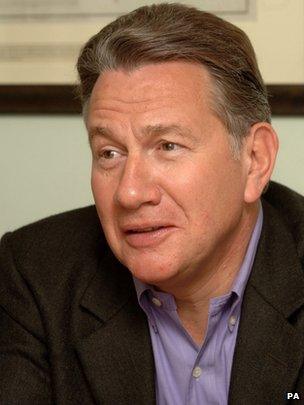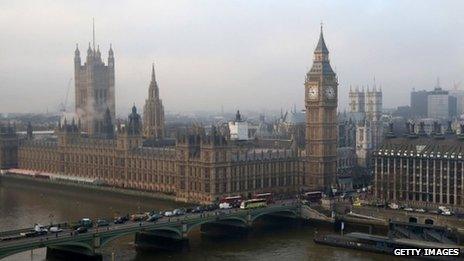Scottish independence: London calling
- Published

Michael Portillo said the English tended not to take the Scottish referendum seriously
Michael Portillo, the former Tory defence secretary, observed this week: "The English tend not to take the Scottish referendum seriously".
He was contributing to a series of articles in the Financial Times, and before David Cameron took it seriously enough to go to the Olympic village to invoke the "Team GB" spirit of the 2012 games.
It's likely Mr Portillo's observation also preceded a deluge of analysis of the "indyref", particularly in the London-based media.
Perhaps it's that slight tightening in the polls. Perhaps it's the odd weather in the south of England's "hurricane alley". Whatever the reason, the London print media has begun to take the independence referendum a lot more seriously.
The Financial Times series was a particularly interesting one from the business perspective. The paper's market niche means it's tuned into the business community, and it also helps shape business and market perspectives.
Since the Scottish Parliament got to work, the FT has had the distinctive approach to Scotland of allocating a member of its foreign staff to the role of covering Edinburgh.
That can bring a fresh perspective. The most recent arrival, Mure Dickie, is a Scot who has reported from both Tokyo and Beijing for the paper.
Better off
Some of its coverage this week has been welcomed by supporters of independence.
The Financial Times began its series with government figures for 2012 showing, in graphic form, that Scotland could be 10.9% better off than the UK average, once you take oil and gas into account.
The graphic was raised by the SNP's Angus Robertson in the House of Commons.
The graphic went on to show how that higher output - and sustained income from oil and gas revenue - would be necessary to sustain Scotland's higher public spending.

The issue was raised in the House of Commons
That didn't get quite the same prominence. But it does puncture the assertion made in Mr Portillo's subsequent article that it would be difficult "to sustain Scotland's massive state in the absence of English subsidy".
There was also selective attention paid to the same edition's warnings that European Union accession is unlikely to be as fast as the Scottish government expect it to be.
The newspaper concluded its week-long series with an editorial saying the Union of the UK is "worth fighting for".
That was partly because it had picked over the economic and business complexities for Scotland of disentangling itself from the UK.
Far-flung groceries
Perhaps more significantly, it had also highlighted some of the problems a "Yes"' vote in Scotland might bring for the rest of the UK, including its position in Europe, its nuclear deterrent, its standing in the world and with the US in particular.
That assessment helps explain why we've begun to hear more from the London media, and from captains of industry in the past few days.
Bob Dudley of BP told the BBC's Hugh Pym that "Great Britain is great" and should stay as it is (a personal view, emphasised the oil major's press office).
And Justin King of Sainsbury's raised the question in the FT (rather obliquely) of whether English and Welsh shoppers would wish to subsidise the extra cost of trucking groceries up the M6 and on to the further-flung parts of a putative foreign nation (it seems this might reflect the supermarkets and the Scottish government not getting on that well since that "health levy" on tobacco and booze sales was introduced).
There was a spat over whether it's appropriate for a Ministry of Defence minister, as reported, to be pushing defence companies to speak out against independence.
Different needs
If that's "bullying and intimidation", as charged by the SNP, then it's apparently not working too well. As I found in reporting investment plans for BAE Systems at its Clyde yards, the big players have the capacity to spot and neutralise incoming political missiles, as well as the military variety.
The FT sought out the views of Scottish Financial Enteprise, representing the finance sector.
It highlighted the possible millions of pounds that new regulatory bodies could cost its members millions of pounds. Alarms were sounded about the risks of banks and insurers being distanced, at least in regulatory terms, from the bulk of their customers.
The view of business, of course, is far from being universally sceptical or nervous about the implications of Scotland going its own way.
Some are some enthusiastic supporters or "relaxed", such as Aberdeen Asset's Martin Gilbert.
And while parts of England fret about immigration, the Institute of Directors in Scotland told the FT that Scotland would do better to have its own immigration policy, reflecting the nation's different economic needs.
'Miserabilist and technical'
What's coming across most strongly from London's fresh look at the independence question is a dawning realisation that Scots are waiting to hear a signal from Westminster, or from the rest of the UK, about what a "No" vote would mean.
Cumbrian Tory MP Rory Stewart preceded the Prime Minister's speech this week saying the English need to tell Scots that they're loved.
The Prime Minister thundered: "We want you to stay".
The question is: what then? "Back to business as normal", or possibly worse, may be one reason why those polls are showing signs of a shift towards "Yes".
The Financial Times' main Westminster commentator, Philip Stevens, echoes the paper's dismay that Scotland could leave the UK.
And he's being echoed by others, such as the Observer's Andrew Rawnsley, who are questioning whether the message of "impoverished irrelevance" or "miserabilist and technical" responses to independence are backfiring.
England, says Stephens, is "turning in on itself" over immigration, austerity and the European Union. "This England veers between patronising Scotland and saying 'good riddance'".
He concludes that either result in September should lead to a looser partnership between Westminster and Holyrood. Without it, were he to have a vote in Scotland, he would cast his vote for a "Yes".
It seems David Cameron got one thing right, and beyond dispute. Those outside Scotland may not have a vote, but they have voices.
In answering that challenge, those voices could be very influential.